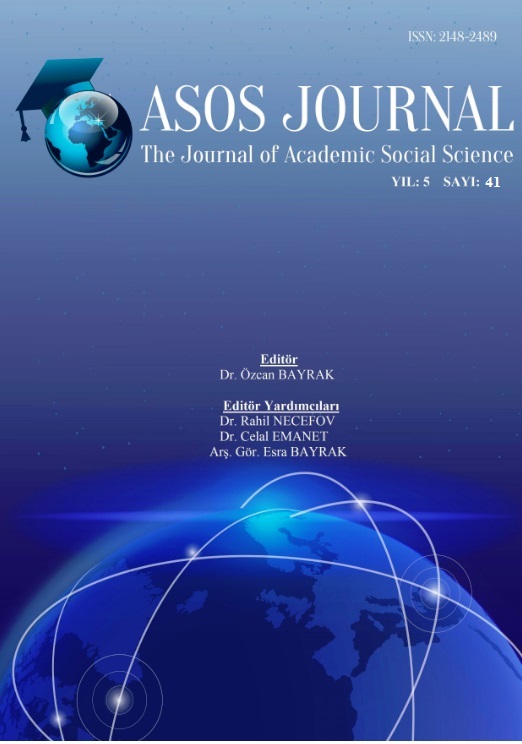Author :
Abstract
Bu araştırmada lisans öğrencilerinin çevreye yönelik etik tutumlarının belirlenmesi amaçlanmaktadır. Araştırma 2015-2016 bahar döneminde Marmara Üniversitesi’nde eğitimini sürdüren lisans öğrencileri (n:397) üzerinde yürütülmüştür. Katılımcılardan veriler “Çevre Etiği Ölçeği” ile toplanmıştır. Ölçek “İnsan Merkezci”, “Tanrı Merkezci”, “Çevre Merkezci”, “Ben-Merkezci” ve “Derin Ekolojist” çevrecilik alt boyutlarından oluşmakta olup 5’li Likert tipi toplam 24 maddeden oluşmaktadır. Ölçeğin Cronbach Alpha Değeri 0,76’tır. Araştırmanın önemli sonuçları içerisinde cinsiyetin çevre etiği tutumunda istatistiksel olarak anlamlı bir değişken olmadığı (p=0,535), sınıflar arasında ise anlamlı farklılık bulunduğu yer almaktadır (p<0,001). Farklılığın hangi sınıf ya da sınıflardan kaynaklandığı incelendiğinde, tüm gruplar arasında istatistiksel olarak anlamlı farklılık olduğu belirlenmiştir. Tüm gruplar için olası tüm ikili karşılaştırmalara ait p değeri <0,001 bulunmuştur. Yani en düşük çevre etiği tutumu 1.sınıflarda, sonra 2.sınıflarda, sonra 3.sınıflarda ve en yüksek 4.sınıflardadır. Eğitim düzeyi arttıkça çevre etiği tutumlarının da pozitif yönde arttığı sonucu çıkmaktadır.
Keywords
Abstract
This study aims at determining the ethical attitudes of the undergraduates towards environment. The study was conducted over the undergraduates (n: 397) continuing their education at Marmara University in the spring period of 2015-2016. The data of participants has been collected by means of “Environment Ethics Scale”. The scale consists of “Anthropocentrism”, “Godcentrism”, “Envirocentrism”, “Egocentrism” and “Deep Ecologist” environmental sub-dimensions and Quintette Likert type 24 Articles in total. The Cronbach Alpha value of the scale is 0,76. The important result of the study is that gender is not a statistically significant variable on environmental attitude (p=0,535), and there is a significant difference among classes (p<0,001). Examining the condition of which class or classes gives or give rise to difference, it has been determined that there is statistical significance among all classes. The value p for all probable binary comparisons for all groups has been found to be <0,001. Namely, the lowest environmental ethic attitude is in the 1st grades, then in 2nd grades, then in 3rd grades and the highest one is in the 4th grades. As the level of education increases, it becomes evident that the environmental ethic attitudes increase in the positive way.





